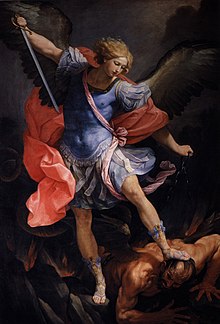
Back Migael (aartsengel) Afrikaans ሚካኤል Amharic Sant Miguel Arcánchel AN ميخائيل (ملاك) Arabic ܡܝܟܐܝܠ (ܡܠܐܟܐ) ARC رئيس الملايكه مايكل ARZ মিকাইল Assamese Mikayıl (arxangel) Azerbaijani Michael (Erzengl) BAR Arkanghel Miguel BCL
Michael | |
|---|---|
 Guido Reni's Saint Michael Defeating Satan (1636) in Santa Maria della Concezione, Rome | |
| Archangel, Prince (Commander) of the Heavenly Host | |
| Venerated in | Judaism All Christian denominations which venerate saints Islam Baháʼí Faith |
| Major shrine | Mont Saint-Michel, The Sanctuary of Saint Michael the Archangel |
| Feast |
|
| Attributes | banner, scales, weighing souls, sword, slaying Satan or a dragon |
| Patronage | Guardian of the Catholic Church,[1] Vatican City, Rome, Lazio, Italy,[2][3] France, Germany,[4] Normandy, France, Kyiv, Ukraine, dying people, poor souls,[5] bankers, grocers, Police, especially Police Officers, Military, especially military personnel and others, etcetera. |
Michael,[Notes 1] also called Saint Michael the Archangel, Archangel Michael and Saint Michael the Taxiarch[6][dead link] is an archangel in Christianity, Judaism, Islam, and the Baháʼí Faith. The earliest surviving mentions of his name are in third- and second-century-BC Jewish works, often but not always apocalyptic, where he is the chief of the angels and archangels, and he is the guardian prince of Israel and is responsible for the care of the people of Israel.[7][8][9][10] Christianity conserved nearly all the Jewish traditions concerning him,[11] and he is mentioned explicitly in Revelation 12:7–12,[12] where he does battle with Satan,[13] and in the Epistle of Jude, where the author denounces certain "ungodly persons" by contrasting them with Michael.[14]
- ^ Alban Butler, The Lives of the Fathers, Martyrs, and Other Principal Saints. 12 vols. B. Dornin, 1821; p. 117
- ^ "Benedict XVI joins Pope Francis in consecrating Vatican to St Michael Archangel". news.va. Archived from the original on 2017-07-09. Retrieved 2013-07-05.
- ^ "St. Michael, the Archangel – Saints & Angels". Catholic.org. Retrieved 2012-12-27.
- ^ Kock, Claudia (8 December 2021). "Heiliger Erzengel Michael: Schutzpatron Deutschlands". die-tagespost.de.
- ^ Kock, Claudia (8 December 2021). "Heiliger Erzengel Michael: Schutzpatron Deutschlands". Donaukurier.de.
- ^ "It is so called in the Orthodox Church". archive.org.
- ^ Asale 2020, p. 55.
- ^ Hannah 2011, pp. 33–54.
- ^ Hannah 2011, p. 33.
- ^ Barnes 1993, p. 54.
- ^ Hannah 2011, p. 54.
- ^ Revelation 12:7–12
- ^ Bromiley 1971, pp. 156–157.
- ^ Hannah 2011, p. 46.
Cite error: There are <ref group=Notes> tags on this page, but the references will not show without a {{reflist|group=Notes}} template (see the help page).